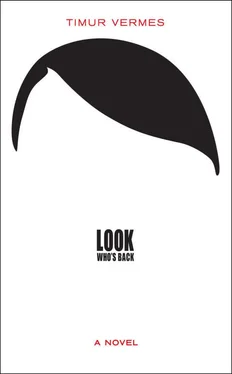My arrival at the Theresienwiese, site of the Oktoberfest, was sobering. Police had cordoned off the vast site, but they were making no efforts to ensure security or order. Barely had I got out of the automobile than two exceedingly drunken individuals staggered towards me and fell into the back seat.
“Brrralleeiiiinschraaasse!” one of the two slurred, while the other seemed to be dozing already. The chauffeur, a powerful man, expelled the two drinkers at once with the words, “Oi! Out! This isn’t a taxi!” He then accompanied me to the venue. “Sorry about that,” he said. “It’s always like this at the bloody Oktoberfest.”
We walked the short distance across the street to the festival site. It was hard to believe that anybody could have struck upon the idea of holding a soirée of any social importance in this godforsaken place. Endless lines of drunkards leaned with their heads against temporary fences, urinating through them. Waiting for a number of these characters were women in a similarly precarious state; it was quite evident that they would have liked to do the same, but dared not due to some subconscious residue of decency. Propped against an advertising column, a couple were engaged in an act of courtship. The man’s intention was to thrust his tongue into her mouth, but because she slipped downwards he missed his target and had to make do with her nose. Responding to his intrusiveness, she opened her mouth and poked her tongue aimlessly in the air. The two of them slid, slowly at first, then more rapidly, down the column until they hit the ground. They shrieked with laughter and tried to say something, but a lack of consonants rendered their babble unintelligible. Lying beneath the woman, the man wriggled about, sat up briefly and then silently plunged a hand into her cleavage. Although it was uncertain whether the woman noticed this at all, three Italians, on the other hand, watched with interest and decided to follow events at closer quarters. These ignominious endeavours failed to attract the attention of anybody else, and certainly not that of the police, who were busy picking unconscious bodies, of which there were plenty, from the ground.
In spite of its name, the Theresienwiese — “Theresa’s Meadow” — possesses very little grass; the only patches of green are to be found around the trees which encircle the site. In this respect, nothing had changed since my first time in Munich. As far as I could make out, drunkards — some of them comatose — occupied almost every one of these patches of grass. Whenever I eyed a vacant spot, I could already see someone reeling towards it. Once at his temporary resting place he would either collapse, throw up, or both. “Is it always like this?” I enquired of the chauffeur.
“Friday’s worse,” he replied calmly. “Bloody Oktoberfest!”
I cannot explain why, but all of a sudden the reason for this human devastation hit me like a bombshell. It must have been down to a decision taken by the N.S.D.A.P. in 1933 to increase further the party’s popularity amongst the Volk: we fixed the price of beer. Since then, other parties had evidently tried to secure their popularity by the same means.
“How typical of these fools,” I blurted out. “Haven’t they raised the price of beer? These days ninety pfennigs for a litre is a joke!”
“What do you mean, ‘ninety pfennigs’?” the chauffeur asked. “It’s nine euros a litre, mate! Ten if you include a tip.”
As I walked past I saw the extraordinary wreckage of beer-corpses. Somehow, despite all their economic mismanagement, these parties must have brought about an unexpected level of prosperity. Well, not having to wage war certainly saves the odd cost. Looking at the state of the Volk here, however, even the most deluded individual would have to admit that in 1942 or 1944, yes, even in the most harrowing nights of bombardment, the Germans were in better shape than on this September evening at the beginning of the third millennium.
Physically, at least.
Shaking my head, I followed the chauffeur, who delivered me to a blonde woman at the entrance to a tent and then returned to his vehicle. With cables around her head and a microphone in front of her mouth, she said with a broad smile, “Hi there, I’m Tschill — and you are?”
“Schmul Rosenzweig,” I said, feeling irritation rise again. Was I really that difficult to recognise?
“Thanks. Rosenzweig… Rosenzweig…” she repeated. “I haven’t got any Rosenzweigs on the list.”
“Heavens above,” I cursed. “Do I look like a Rosenzweig? Hitler! Adolf!”
“You could have said that in the first place,” she wailed with such a quiver in her voice that I almost felt sorry for my remark. “Have you got any idea of how many people we get here? I can’t be expected to know them all! Especially not if they start giving false names. Earlier I got Becker’s wife mixed up with his ex-girlfriend — he gave me a right roasting for that…”
I am no stranger to sympathy. A true Führer feels for each and every one of his fellow Germans as if they were his own children. But pity never helped anyone.
“Brace yourself,” I said sharply. “You are at this post because your superior officer is depending on you! Do your best and he will not fail to lend you his support!”
She gave me a look of bewilderment, but — as often happens in the trenches — my harsh words must have sparked some courage in her. She nodded and led me to the party in the upper section of the tent, where I was immediately introduced to the editor. This was a seasoned blonde lady in a dirndl, with shining blue eyes. Her vivacity convinced me that she would have made a perfect office supervisor in party headquarters. I might not necessarily have entrusted her with a newspaper, although… a gossip sheet with health tips and knitting patterns… that might work, who knows? She was probably very keen to talk; she looked as if she had already raised four or five children, and she must be terribly lonely at home.
“Ah!” she beamed. “Herr Hitler!” The corners of her eyes twinkled mischievously, as if she had just cracked an hilarious joke.
“Correct,” I said.
“I’m so delighted you’re here.”
“Madam, the pleasure is all mine,” I said, and before I could add another word her face broke into an even more radiant smile. When she turned to the side I assumed that a mandatory photograph was about to be taken. Adopting a serious expression, I turned in the same direction, there was a flash, and my audience was at an end. In my mind I rapidly sketched a four-year plan according to which this editor would spend at least five minutes talking to me here next year, and twenty the year after that — only in theory, of course, because by that stage my intention was to be able to say a polite “No, thank you” to these sorts of invitations. Then she would have to make do with someone like Göring.
“Catch you later,” the editor said silkily. “I hope you can stay for a while.” At which a young woman dressed in folk costume dragged me over to a gaggle of women similarly dressed.
This was one of the most frightful regional customs I had ever had the misfortune to experience. Not only the editor and this young woman, but every last damsel in the locality had felt obliged to squeeze herself into dresses which were zealously styled on those worn by country wenches, but which even at first glance revealed themselves to be hideous imitations. We had gone down the same path in the League of German Girls, I admit, but there, as the name implies, we were dealing with girls . Assembled here, by contrast, were predominantly women whose girlhood lay at least a decade in the past, if not several. I was led to a beer table where a number of people were already seated.
Читать дальше












